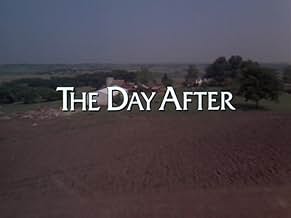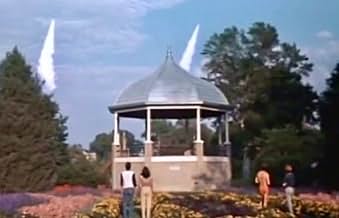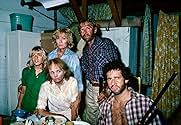Siamo a Lawrence, cittadina a 40 Km da Kansas City. La vita di ogni giorno trascorre tranquilla. Ma si diffondono notizie allarmanti di una escalation bellica. All'improvviso i missili foran... Leggi tuttoSiamo a Lawrence, cittadina a 40 Km da Kansas City. La vita di ogni giorno trascorre tranquilla. Ma si diffondono notizie allarmanti di una escalation bellica. All'improvviso i missili forano il cielo e si abbattono al suolo, è la catastrofe nucleare.Siamo a Lawrence, cittadina a 40 Km da Kansas City. La vita di ogni giorno trascorre tranquilla. Ma si diffondono notizie allarmanti di una escalation bellica. All'improvviso i missili forano il cielo e si abbattono al suolo, è la catastrofe nucleare.
- Vincitore di 2 Primetime Emmy
- 6 vittorie e 11 candidature totali
- Stephen Klein
- (as Steven Guttenberg)
Recensioni in evidenza
While this movie is not perfect (they should have had a couple less story lines going), this movie is the best attempt to show what was previously a very realistic scenario. While it's very toned down from what would actually happen after a nuclear attack, showing people out in the middle of nowhere trying to survive or just showing everyone die in a matter of a few days would not have had the same impact. This movie shows as graphically as could be shown on US network television a glimpse of the horror of nuclear war. The special effects and makeup are very good for a made for TV movie in 1983, impressive actually. The attack is shown is a very shocking and realistic manner (other than lessening the actual size of damage that would occur). The aftermath makes you realize that the lucky ones were those that were instantly vaporized. Although they don't show it, you realize that all of the characters that fought for so long against radition poisoning were not going to make it much longer. It shows many sides of human nature that would come to the surface under such circumstances and hints towards even worse ones that couldn't be shown. Although the cold war is behind us, these weapons are still around and there will come a time someone wants to use them. Everyone should see this movie to give them at least a small glimpse at why we can never allow that to happen.
So why is there any discussion of the differences? To debate the flaws and merits of one horror in many variations is pointless, for they are all important, all special and all as relavant today as they were when they were first created. Perhaps we have learned nothing?
I feel that the plot was created well. The film shows what happens before the attacks, the actual attacks and then what happens after the attacks. The attacks were not shown too soon after the movie began but well into the movie and built up enough to show a lot of drama. The acting is very good, in my opinion. The late Jason Robards plays the lead role and a few other familiar faces take part as well (Steve Guttenburg, John Lithgow). The writing is fair, but not bad for a made-for-TV movie.
Overall, the movie is very excellent and places itself very positively in my book. It was a very controversial film for its time and it did scare the hell out of many people (truthfully, it did shake me up a little the first time I saw it). It's really not for the kids, even though it was a TV movie, because the scenes of the nuclear blasts and radiation sickness aren't very light.
That didn't matter. The film had as great, and possibly even more of, an impact on those of us out on the "tip of the spear" as it did on those back home. The military characters seen in the film were not actors -- they were contemporaries of ours, some even familiar faces -- so we felt a true connection to the story. The tension between the US and the Soviet Union was real and nobody knew better than we how nasty things could get in a short period of time. Even as we watched the film over the ship's closed circuit television system, Soviet military units were intent on locating and targeting our Battle Group. Our job, our daily routine, was part of the story, which emphasised the point that we were responsible for keeping the peace and to not allow events to escalate as we all feared could happen.
The reaction I remember most from this film was worry for family back home. -SPOILER- The one airman who left the silo area to reach his family before the missiles arrived displayed a sentiment that we all felt. No one aboard our ship would shirk his duty, but we all understood the sentiment that once duty is done, family is foremost in mind.
The argument could be made that the film was rife with error, but I maintain that it ultimately succeeded in what it was designed to do...make people seriously consider the consequences of nuclear war. That point was not lost on those of us aboard the Ranger at the time. While I watched the film again just recently (21 years after the first viewing), the lesson was still not lost. We may or may not be vulnerable to such a massive strike as what was feared back in the 1980s, but nuclear terror is still a very real possibility. It is as imperative now, as it was then, that we ensure that this type of calamity is never visited upon anyone, especially those about whom we love and care.
Yes, better special effects would make from some jaw-dropping images, but would that improve upon the film's message? In my opinion, no.
Lo sapevi?
- QuizThe program originally aired on November 20, 1983. It remains the most-watched TV movie in U.S. history. Estimates put the viewership at over 100 million Americans, with a Nielsen share of 62 percent.
- BlooperWhen Dr. Austin (Lin McCarthy) is explaining the effects of the electromagnetic pulse (EMP) from the nuclear blast, he says. "It's all theoretical. It's never happened before." In actuality, the United States detonated a 3.8 megaton warhead at an altitude of 50 miles, 1 August 1958, in the Operation Hardtack Teak shot nuclear test. This event caused unexpected communications disruption and damage to electrical equipment in an area that ranged between Hawaii and New Zealand. It was the first observation of the EMP effect.
- Citazioni
[intercontinental ballistic missiles are being fired]
Cynthia: What's going on?
Joe Huxley: Those are Minuteman missiles!
Cynthia: Like a test, sort of... like a warning?
Joe Huxley: [shakes his head, staring at the missiles in awe and disbelief] They're on their way to Russia. They take about 30 minutes to reach their target.
Aldo: So do theirs, right?
- Curiosità sui crediti[After movie has ended, before end credits.] The catastrophic events you have just witnessed are, in all likelihood, less severe than the destruction that would actually occur in the event of a full nuclear strike against the United States. It is hoped that the images of this film will inspire the nations of this earth, their peoples, and leaders to find the means to avert that fateful day.
- Versioni alternativeThe rare laserdisc version (released by Image Entertainment in 1995) is advertised as being a director's cut. This version runs 127mins, is widescreen in its proper ratio of 1:75:1 and has a commentary track by director Nicholas Meyer. At the time of this release full versions of the film were not readily available. So it stands to chance this director's cut is actually the same as the current mgm dvd (US region 1) as far as content and running time goes, with the exception of the widescreen format and commentary track which so far has only be found on this laserdisc.
- ConnessioniEdited from Panico nello stadio (1976)
































